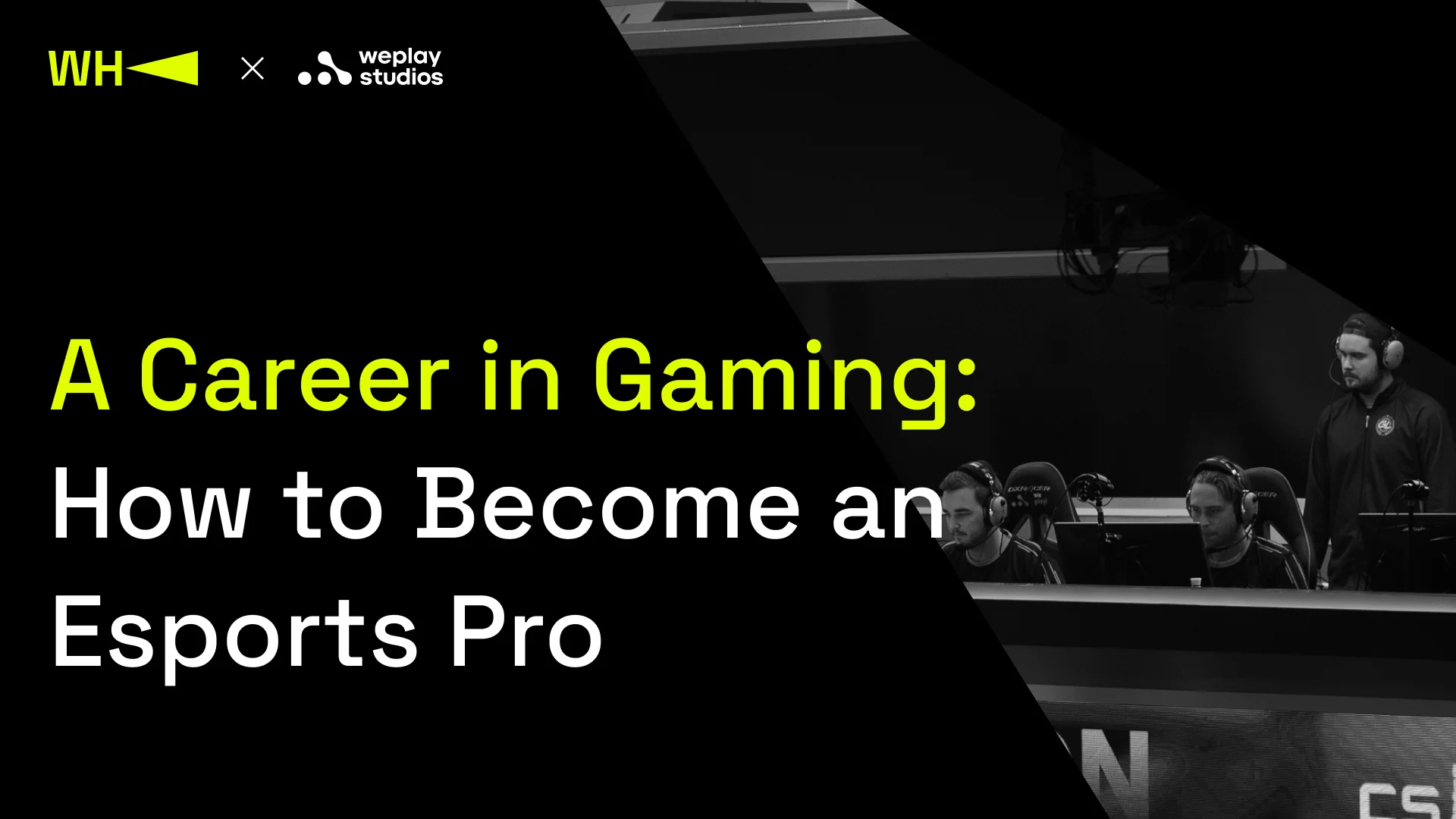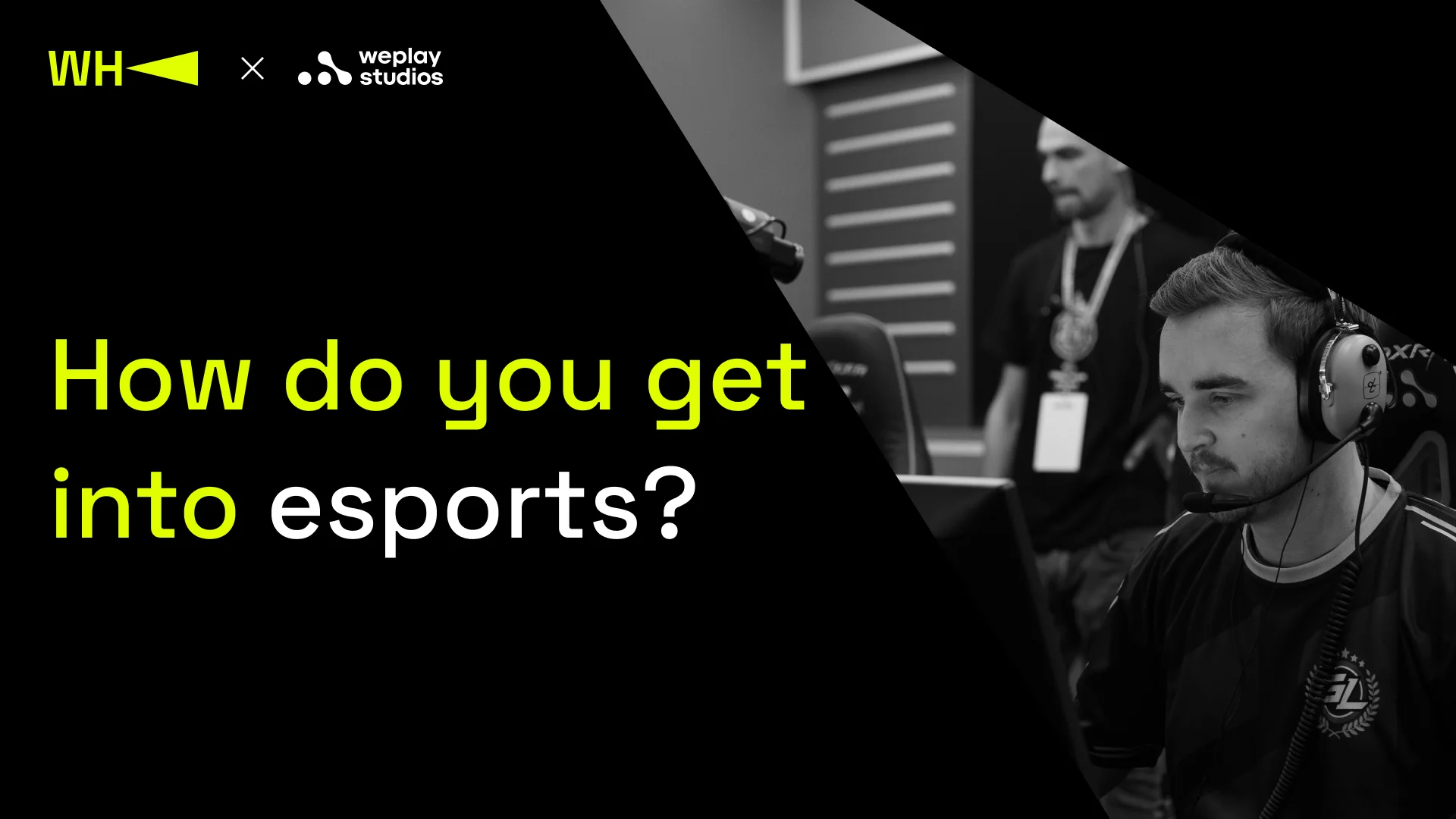Aug. 7, 2023
A Career in Gaming: How to Become an Esports Pro

5 min read
Esports tournaments may be mind-blowing. Huge arenas chock-full of people cheering for their favorites, esports players reveling in the spotlight, music blasting from the speakers, hosts keeping everyone on the edge of their seats... And the tension rises even more in the few crucial minutes that will see someone come out victorious. Most likely, many of those who have watched a tournament at least once have wondered at least once: “How does one become an esports athlete?”
WePlay Studios CMO Iryna Chuhai recently answered this very question at the Creative Practice charity marathon in support of the Armed Forces of Ukraine.
While some fervently argue that everyone can compete in the arena, detractors can intimidate one into thinking that it’s a full-blown obstacle course that your average gamer shouldn’t even bother trying to complete. Is there a middle ground between these clashing views? Iryna earnestly tries to help you objectively assess your chances of getting into an esports roster and shares some insights that may come in handy.
How hard is it to get into esports?
Let’s try to assess a hypothetical gamer’s options using the example of one of the many esports disciplines — Counter-Strike: Global Offensive (CS:GO). It’s one of esports’ most popular titles. For example, the BLAST.tv Paris Major 2023, one of the top CS:GO tournaments, drew around 1.5 million viewers at its peak.
About four million people play CS:GO in the world, while the pros are a little less than a thousand. A professional esports player is one who has participated in at least one professional match. It’s clear there are even fewer of those who have won and could earn prize money with their superior play. Plus, even though professional tournaments sometimes do have multimillion-dollar prizes, there are also those where the prize pool barely reaches $50,000 to be shared among all participants. But to soften a little these sad statistics, the competition gets just as fierce in traditional sports. For example, in basketball, only about 0.02% of all school team players eventually reach the pro level. However, if you really believe that the esports scene is the place to be for you professionally, follow your dream.
How do you get into esports?
Once again, it’s worth comparing esports and regular sports. Any student can play sports and join their school’s team. After graduation, the top players may be offered a place at a college. Eventually, the best players from college leagues will be noticed by scouts and possibly invited to a pro league. Of course, this is a long and complicated journey, but at least it’s not an uncharted path. In esports, everything is a little more problematic. There is no such well-oiled scheme here, so all the difficulties fall on the shoulders of the players themselves. However, do take note of these tips that may increase your chances.
Practice (a lot)
Nothing groundbreaking about this, but it really does work. You may consider yourself a prodigy, but constant training is a must and the first step to any great goal. Professional esport players practice 6–10 hours per day — it’s basically their full-time job. Let me make this clear: they don’t just play; they train. In general, that means they record and analyze each of their games, look into other professional players’ techniques, watch pro tournaments online, etc. It may seem fun if you’re an avid video game player, but in reality, it takes a lot of time, hard work, and discipline. Keep in mind that at least a hundred people would like to get into a professional esports team instead of you at any given time, so you need to become the best. To achieve better results, you should pick someone stronger — maybe even a professional esports athlete — to compete with and hone your competitive gaming skills.
Make yourself visible
Since there is no well-established track in esports for young talents’ development, even a great player may never get a chance to get onstage if they do not show themselves.
This means that you need to create such a chance for yourself. First, make time to spruce up your social media and start a Twitch channel. Stream how you play, share your tricks — in a word, get people interested. It’s not just about the number of subscribers but their attitude towards you. Esports is watched by people who root for other people. That is, you need your gaming community to root for you. There is a lot to be told about how to develop your social media, but then we would completely stray from the topic.
The second tip is: watch your stats. For example, platforms like FaceIt, besides helping you find like-minded gamers to play against, provide you with the tools to track your stats. Your rating can attract the attention of scouts and help you score a ticket to an esports league.
Build up experience
Try to build your own team or join an existing one to participate in amateur tournaments. By the way, an amateur team can also be assembled on FaceIt. Moreover, if you take on the role of captain, you will be able to develop leadership skills, which is sure to get you extra points.
Esports is bigger than you think
Constantly training, both with a professional team and on your own, following all game updates, and monitoring relevant media, you can dive deep into the esports world. However, all the tips given here will increase your chances of making it in esports, but they are by no means a guarantee. But even if all else fails, you can still turn your passion for esports into a professional career path.
The world of esports is a huge ecosystem, and there is a good chance someone on its vast expanses is looking for people with your skills. For example, skilled players are part of huge esports organizations such as NAVI or G2 Esports, but besides the players themselves, these orgs employ other people: PR pros, content creators, team members’ assistants, and the list goes on.
But that’s not all. In the esports industry, there are tournament organizers who create shows where players can prove themselves. These companies employ hundreds of people. WePlay Studios, for example, is always looking for people who vibe with the energy of esports.
Also, do not forget about publishers, game developers, and the even bigger gaming industry that we have to thank for such a huge selection of disciplines. All in all, although the competition to become a pro gamer is intense, you can still find a place for your skills in esports.

